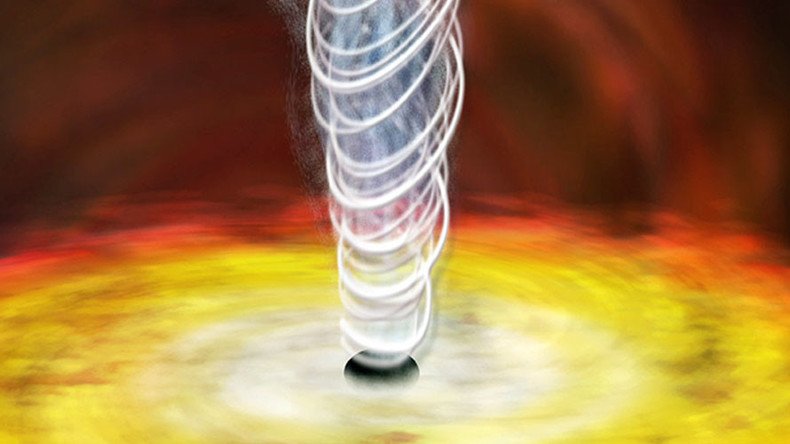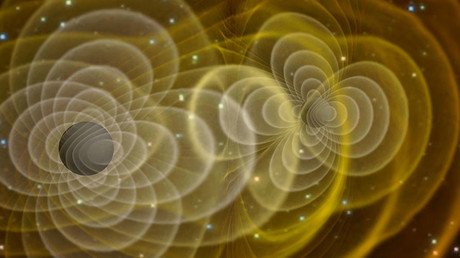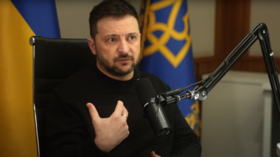‘We proved Einstein right!’ 100 years on, gravitational waves confirmed in breakthrough research

Scientists at Washington’s National Science Foundation and Moscow State University have confirmed the discovery of Albert Einstein’s gravitational waves. The breakthrough, possibly the biggest in physics in a century, could be the key to new understanding of the universe.
Recent rumors of the success in detecting gravitational waves, or as some scientists put it "very weak spacetime wiggles which propagate at the speed of light" were officially confirmed Thursday.
"Ladies and gentelman, we have detected gravitational waves" dice David Reitze, director del @LIGO. pic.twitter.com/WmczsUFP5W
— Julián (@erreJulian) February 11, 2016
"Ladies and gentlemen! We have detected gravitational waves, we did it!," LIGO laboratory executive director David Reitze announced in Washington.
"These gravitational waves were produced by two colliding black holes, [that] came together, merged and formed a single black hole about 1.3 billion years ago," Reitze said.
These ripples in the fabric of spacetime are one of the most important variables in Einstein's theory of relativity and it took astronomers decades to detect them, although they were pretty sure that gravitational waves existed.
LIVE: Total power output in #GravitationalWaves was 50 times greater than all stars in the universe combined https://t.co/oN9x0uQTcN#LIGO
— RT (@RT_com) February 11, 2016
The discovery has been made with the use of the Laser Interferometer Gravitational-wave Observatory (LIGO) - a system of two detectors constructed to spot tiny vibrations from passing gravitational waves. Funded by the National Science Foundation, LIGO's identical detectors are located in Livingston, Louisiana, and Hanford, Washington.
The observatories, which are "the most precise measuring device ever built," recorded a signal on September 14, 2015, "nearly simultaneously," and the signal "had a very specific characteristic," the laboratories' director said.
"As time went forward, the frequency went up," he explained, adding that it took scientists months of careful checking and analysis to confirm that what had been discovered was exactly gravitational waves.
Each of the two black holes before merging had about 30 times the mass of the Sun, were 150 kilometers (93 miles) in diameter and accelerated to about half the speed of light. The detected collision also proved that the merging of binary black holes does exist in the universe.
"Let's say this: The first discovery of gravitational waves is a Nobel Prize-winning venture," said physicist Bruce Allen of the Max Planck Institute for Gravitational Physics in Hannover, Germany.
But the prize will be most possibly given not to theorists, but those who are behind the mechanism that confirmed the existence of the waves, Doctor of Physical and Mathematical Sciences Pavel Ivanov told RT.
Russian scientists have massively contributed to both of the advances, Ivanov explained, mentioning Soviet scientist Yakov Zeldovich and member of the Russian Academy of Sciences Vladimir Braginsky, who has been closely working with Kip Thorne, the American astrophysicist at the forefront of the discovery.
The idea to look for the waves was suggested and published in science magazines by Soviet physicists Mikhail Gertsenshtein and Vladislav Pustovoit in 1962, and then developed further by academic Zeldovich and his followers, who explored the theory of gravitational waves. Braginsky and his teams have been working on developing detectors for LIGO.
According to Einstein's theory, published in 1916, the universe is made up of a "fabric of spacetime": massive accelerating objects in the universe are believed to bend this fabric, causing ripples known as gravitational waves. The colliding of two black holes or merging of two pulsars are among the presumable causes of such waves' formation.
"The theory describes geometry of space and time. When gravitational wave propagates, it changes [this] geometry," Ivanov told RT, adding that "in general relativity and all modern studies of gravity the gravitational field is considered as something that is similar to the electromagnetic field."
"The discovery of gravitational waves could open a new window in our universe, because before we studied it only using electromagnetic [knowledge], and now we can do it in almost all wave bands, from radio waves to gamma rays," Ivanov said.
The ability to analyze the information carried on gravitational waves could potentially provide more insight into the Big Bang and other violent events in the history of the Universe, and help to explore if other universes exist, what is inside Black Holes and even potentially pave the way for time travel.
LIVE: Russian scientists discuss #gravitationalwave search https://t.co/YhXaWM4RpVpic.twitter.com/RewCvtSdbf
— RT (@RT_com) February 11, 2016
Although Einstein predicted that gravity travels in waves a century ago, detecting gravitational waves was not an easy task due to the fact that their effect is miniscule and easily confused with random noise.
"Everything causes noise: a car passing by, a plane in the sky, or even tiny movements of the Earth's crust. Detecting a signal amid all this noise is extremely difficult, although of course there are methods, both mathematical and technological - and it costs a lot of money," Ivanov told RT.
The discovery might lead to creation of new chapter in physics – quantum gravity, scientists believe. It will bring together the knowledge in Einstein's theory and wave mechanics.
LISTEN MORE:













